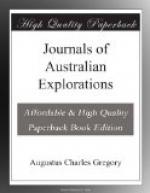Latitude by Vega 18 degrees 14 minutes 25 seconds.
13th September.
At 8.5 a.m. steered east-north-east through box-flats with broad-leafed melaleuca, with a little grass. The country gradually became more scrubby with grevillia, terminalia, bloodwood, and triodia; the soil very poor, and in some parts sand and gravel. At 2.0 p.m. altered the course to north, and at 5.50 came to a dry creek in a rocky channel trending west, which we followed down till 6.15, and camped without water.
14th September (Sunday).
At 5.50 proceeded down the creek on a nearly west course, searching the channel in its winding course for water, but without success, till 10.0, when we found a pool of good water fifty yards long and two feet deep, at which we encamped. Some blacks had been camped at this pool, and their fires were still burning. The country on the creek is very poor, with patches of open melaleuca scrub, box, bloodwood, leguminous ironbark, terminalia, white-gum, and a few pandanus, triodia, and a little very dry grass. The soil sandstone, with ironstone gravel. The native bee appears to be very numerous, and great numbers of trees have been cut by the blacks to obtain the honey.
Latitude by a Aquilae 17 degrees 59 minutes 26 seconds.
Level country. Scarcity of water.
15th September.
At 8.15 a.m. resumed our journey north 10 degrees magnetic, over a very level country thinly wooded with box, bloodwood, melaleuca, terminalia, grevillia, and cotton-trees, also a small tree which we recognised as Leichhardt’s little bread-tree, the fruit of which, when ripe, is mealy and acid, but made some of the party, who ate it, sick. Several dry watercourses trending west were crossed, and at 2.5 p.m. camped at a small waterhole in a sandy creek, fifteen yards wide. By enlarging the hole we obtained, though with difficulty, a sufficient supply of water for our horses. On the flats near the creek the grass was good, but very dry.




